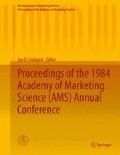Abstract
In a laboratory study involving brand choice of hi fi receivers, subjects who were free to use paper and pencil as an external memory aid used more complex choice strategies than subjects that were not provided with paper and pencil. These results are interpreted to mean that current information processing theories of consumer choice may overstate the effects of short term memory constraints.
1The authors wish to acknowledge the assistance of Tyran Jean Fischman in the collection and analysis of the data reported in this study.
Access this chapter
Tax calculation will be finalised at checkout
Purchases are for personal use only
Preview
Unable to display preview. Download preview PDF.
References
Jacoby, Jacob, Robert W. Chestnut, Karl C. Weigl, and William A. Fischer (1976), "Pre-purchase Information Acquisition: Description of a Process Methodology, Research Paradigm, and Pilot Investigation," Advances in Consumer Research, 3, Chicago: Association for Consumer Research, 306–314.
Olshavsky, Richard W. (1983), "A Theoretical Perspective for Predicting the Impacts of Personal Computers on Consumer Behavior," paper presented at the Joint Conference of American Marketing Association, Central Indiana Chapter of AMA, and Marketing Department of Ball State, Muncie, IN, (April). Forthcoming in Proceedings, (eds.) Donald Mulvihill and Jim Lowry.
Olshavsky, Richard W. and Frank Acito, (1980), "The Impact of Data Collection Procedure on Choice Rule," Advances in Consumer Research, Vol. 7, 729–732.
Olshavsky, Richard W. (1979), "Task Complexity and Contingent Processing in Decision Making: A Replication and Extension," Organizational Behavior and Human Performance, 24, 300–316.
Payne, J., Braunstein, M., and Carroll, J. (1978), "Exploring Pre-decisional Behavior: An Alternative Approach to Decision Research," Organizational Behavior and Human Performance, 22, 17–44.
Payne, John W. (1976), "Task Complexity and Contingent Processing in Decision-Making: An Information Search and Protocol Analysis," Organizational Behavior and Human Performance, 16, (August): 366–387.
Simon, Herbert A. (1969), The Sciences of the Artificial, Cambridge, Mass.: MIT Press.
Author information
Authors and Affiliations
Editor information
Editors and Affiliations
Rights and permissions
Copyright information
© 2015 Academy of Marketing Science
About this paper
Cite this paper
Olshavsky, R.W., Acito, F. (2015). The Effect of External Memory Aids on Choice Strategy1 . In: Lindquist, J.D. (eds) Proceedings of the 1984 Academy of Marketing Science (AMS) Annual Conference. Developments in Marketing Science: Proceedings of the Academy of Marketing Science. Springer, Cham. https://doi.org/10.1007/978-3-319-16973-6_19
Download citation
DOI: https://doi.org/10.1007/978-3-319-16973-6_19
Publisher Name: Springer, Cham
Print ISBN: 978-3-319-16972-9
Online ISBN: 978-3-319-16973-6
eBook Packages: Business and EconomicsBusiness and Management (R0)

